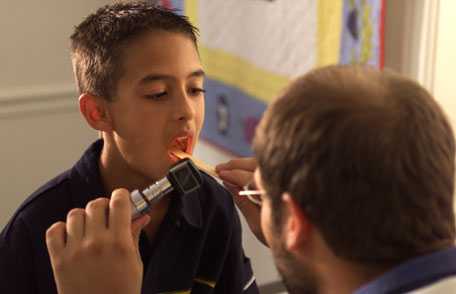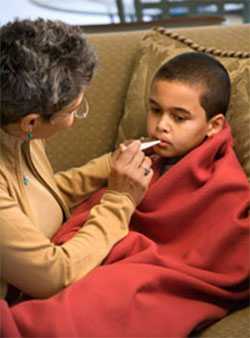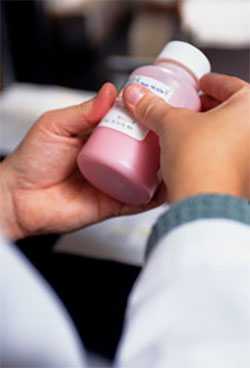Worried your sore throat may be strep?

Strep throat is a common type of sore throat in children, but it’s not very common in adults. Healthcare professionals can do a quick test to determine if a sore throat is strep throat. If so, antibiotics can help you feel better faster and prevent spreading it to others.
Many things can cause that unpleasant, scratchy, and sometimes painful condition known as a sore throat. Viruses, bacteria, allergens, environmental irritants (such as cigarette smoke), and chronic postnasal drip can all cause a sore throat. While many sore throats will get better without treatment, some throat infections—including strep throat—may need antibiotic treatment.
How You Get Strep Throat
Strep throat is an infection in the throat and tonsils caused by group A Streptococcus bacteria (called “group A strep”). Group A strep bacteria can also live in a person’s nose and throat without causing illness. The bacteria spread through contact with droplets after an infected person coughs or sneezes. If you touch your mouth, nose, or eyes after touching something with these droplets on it, you may become ill. If you drink from the same glass or eat from the same plate as a sick person, you could also become ill. It is also possible to get strep throat from touching sores on the skin caused by group A strep.

A fever is a common symptom of strep throat.
The most common symptoms of strep throat include:
- Sore throat, usually starts quickly and can cause pain when swallowing
- A fever
- Red and swollen tonsils, sometimes with white patches or streaks of pus
- Tiny, red spots (petechiae) on the roof of the mouth (the soft or hard palate)
- Swollen lymph nodes in the front of the neck
Other symptoms may include headache, stomach pain, nausea, or vomiting. Someone with strep throat may also have a rash known as scarlet fever (also called scarlatina).
Strep throat symptoms typically do not include:
- Cough
- Runny nose
- Hoarseness (changes in your voice that makes it sound breathy, raspy, or strained)
- Conjunctivitis (also called pink eye)
These symptoms suggest that a virus is the cause of the illness.
A Simple Test Gives Fast Results
No one can diagnose strep throat just by looking at your throat. Instead, healthcare professionals use two tests to see if group A strep bacteria are causing a sore throat. A “rapid strep test” involves swabbing your throat and gives results quickly. If the test is positive, your healthcare professional can prescribe antibiotics. If the test is negative, but your healthcare professional still strongly suspects strep throat, then they order a throat culture. A throat culture involves sending a throat swab to a lab to see if bacteria grow from the sample. For that reason, a throat culture takes more time to get results.

Antibiotics reduce the length of time you’re sick and reduce your symptoms.
Antibiotics Get You Well Fast
Test results help your healthcare professional decide if you need antibiotics, which can:
- Decrease the length of time you’re sick
- Reduce your symptoms
- Help prevent the spread of infection to others
- Prevent more serious complications, such as tonsil and sinus infections, and acute rheumatic fever (a rare inflammatory disease that can affect the heart, joints, skin, and brain)
You should start feeling better in just a day or two after starting antibiotics. Call your healthcare professional if you don’t feel better after taking antibiotics for 48 hours. People with strep throat should stay home from work, school, or daycare until they no longer have a fever and have taken antibiotics for at least 24 hours so they don’t spread the infection to others.
Take the prescription exactly as your healthcare professional tells you. Don’t stop taking the medicine, even if you feel better, unless your healthcare professional tells you to stop taking it.
More Prevention Tips: Wash Those Hands
The best way to keep from getting strep throat is to wash your hands often. Also, avoid sharing eating utensils, like forks or cups. Anyone with a sore throat should wash their hands often and cover their mouth when coughing and sneezing. There is no vaccine to prevent strep throat.
- Page last reviewed: October 16, 2017
- Page last updated: October 16, 2017
- Content source:
- National Center for Immunization and Respiratory Diseases, Division of Bacterial Diseases
- Page maintained by: Office of the Associate Director for Communication, Digital Media Branch, Division of Public Affairs




 ShareCompartir
ShareCompartir